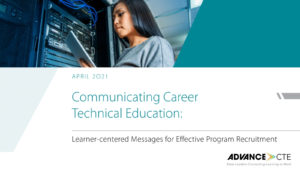The impending summer season is a great time for state and local Career Technical Education (CTE) leaders to take a step back and evaluate how existing recruitment plans and practices reach each learner and family to achieve an effective and equitable recruitment process.
As conversations continue about potential national investments in the career preparation ecosystem, it is essential that communications about CTE align with what matters most to families in their education, and address in detail the opportunities provided through CTE to meet those needs. Recruitment processes and communications must also address lingering stigmas, lack of knowledge and systemic barriers that have prevented learners of color, learners experiencing low income and other historically marginalized populations from participating in and fully benefiting from the potential of CTE programs.
 Today, Advance CTE released a second round of tools to help state and local CTE leaders implement updated communications research released in April 2021 on tested messages and messengers for CTE that resonate with learners and families. The research also details equity considerations and message tailoring for Black and Latinx families and families experiencing low income so that each learner feels welcomed, supported and has the means to succeed in CTE programs.
Today, Advance CTE released a second round of tools to help state and local CTE leaders implement updated communications research released in April 2021 on tested messages and messengers for CTE that resonate with learners and families. The research also details equity considerations and message tailoring for Black and Latinx families and families experiencing low income so that each learner feels welcomed, supported and has the means to succeed in CTE programs.
Developing and executing a recruitment plan can seem like a big undertaking, but Advance CTE is here with simple steps to help you get started.
Here are five easy ways to put this research into action this summer using messages and tools from Advance CTE:
- Learn the key messages that resonate with families and learners about CTE, and message tailoring considerations to reach Black and Latinx families and families experiencing low income. Our core messages resource provides three top messages for all audiences and additional messages for historically marginalized populations.
- Evaluate your current communications tools, including newsletters, digital media, website and printed materials. Do the materials include these tested messages? Have steps been taken to remove barriers to each family accessing and fully understanding information about CTE programs? Our messaging card provides a starting point for effective use of messages.
- Inform your colleagues about key messages, and develop a plan of action to share these messages with stakeholders to ensure consistent communication both during and after CTE recruitment season. Our newly updated communications advocacy guide provides five keys to success and a step-by-step process to develop a plan. Advance CTE has created a ready-made slide deck and talking points that make it easy to share these findings in a 20 minute presentation.
- Engage your ambassadors and trusted sources to receive feedback about current recruitment practices and communications materials. Advance CTE’s newly updated parent engagement tool provides seven steps and assessments to evaluate current practices and fully leverage your team and ambassadors in the recruitment process.
- Reintroduce the value and impact of CTE to families through digital media this summer as you make plans to align messaging and equitable outreach across all communication channels. Advance CTE’s social media guide and ready-to-use graphics assist leaders in navigating the differences among digital platforms and keep messages about the impact of CTE front-of-mind for families this summer.
Visit our Engaging Families and Learners web page for the full research report and list of communication and implementation resources. Visit Advance CTE’s Learning that Works Resource Center for additional resources on communication, career advisement and access and equity.
Advance CTE is here to help leaders fully realize and leverage this research and their state and community. Email [email protected] with questions or to receive assistance in putting this research into action.
Tags: Access and Equity, communications, enrollment, parents, recruitment, Social Media

